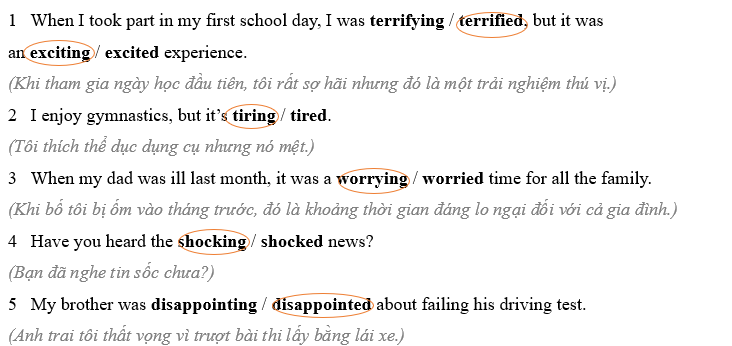IC. Vocabulary - Introduction - SBT Tiếng Anh 11 Friends Global
1. Complete the definitions with the adjectives below. 2. Read the speech texts. How is each speaker feeling? Choose the best adjective from exercise 1. 3. Complete the sentences with personality adjectives from below. There are six extra adjectives.
Bài 1
Adjectives
I can form and use a variety of adjectives correctly.
1. Complete the definitions with the adjectives below.
(Hoàn thành các định nghĩa với các tính từ dưới đây.)

1 ____________ : angry
2 ____________: sad because something is worse than you hoped or expected
3 ____________: happy because something is better than you hoped or expected
4 ____________: not able to understand what is happening
5 ____________: worried
6 ____________: not interested in what is happening
7 ____________: very pleased
8 ____________: very frightened
9 ____________: feeling bad because you did something wrong
10 ____________: unhappy because you want something that belongs to somebody else
11 ____________: happy about something you have achieved
12 ____________: very surprised and upset
13 ____________: unhappy about something that happened
Phương pháp giải:
*Nghĩa của từ vựng
anxious (adj): lo lắng
ashamed (adj): hổ thẹn
bored (adj): chán
confused (adj): bối rối
cross (adj): tức
delighted (adj): vui
disappointed (adj): thất vọng
envious (adj): ghen tị
proud (adj): tự hào
relieved (adj): nhẹ nhõm
shocked (adj): sốc
terrified (adj): kinh hoàng
upset (adj): buồn
Lời giải chi tiết:

1 cross: angry
(tức: tức giận)
2 disappointed: sad because something is worse than you hoped or expected
(thất vọng: buồn vì điều gì đó tồi tệ hơn bạn mong đợi hoặc mong đợi)
3 relieved: happy because something is better than you hoped or expected
(nhẹ nhõm: hạnh phúc vì điều gì đó tốt hơn bạn mong đợi hoặc mong đợi)
4 confused: not able to understand what is happening
(bối rối: không thể hiểu chuyện gì đang xảy ra)
5 anxious: worried
(lo lắng: lo lắng)
6 bored: not interested in what is happening
(chán: không quan tâm đến chuyện đang xảy ra)
7 delighted: very pleased
(hài lòng: rất hài lòng)
8 terrified: very frightened
(kinh hoàng: rất sợ hãi)
9 ashamed: feeling bad because you did something wrong
(xấu hổ: cảm thấy tồi tệ vì mình đã làm sai điều gì đó)
10 envious: unhappy because you want something that belongs to somebody else
(ghen tị: không vui vì bạn muốn thứ gì đó thuộc về người khác)
11 proud: happy about something you have achieved
(tự hào: vui mừng vì điều gì đó bạn đã đạt được)
12 shocked: very surprised and upset
(Sốc: rất ngạc nhiên và buồn)
13 upset: unhappy about something that happened
(buồn: không vui về điều gì đó đã xảy ra)
Bài 2
2. Read the speech texts. How is each speaker feeling? Choose the best adjective from exercise 1.
(Đọc các văn bản bài phát biểu. Mỗi người nói cảm thấy thế nào? Chọn tính từ đúng nhất ở bài tập 1.)
1 Have you seen Molly’s new coat? She’s so lucky. I wish I had one like that.
________________________________________
2 It’s OK, I’ve found my keys. They were in my bad. That’s good!
________________________________________
3 Stop taking my pen. I need it. You’re being really annoying!
________________________________________
4 How strange. I’m sure I got a text from him, but I can’t see it on my phone.
________________________________________
5 I really needed more than 60% in my test, but I only got 55%. I worked hard too.
________________________________________
6 I feel really bad because I lied to my parents about where I was last night.
________________________________________
Lời giải chi tiết:
1 Have you seen Molly’s new coat? She’s so lucky. I wish I had one like that.
(Bạn đã thấy chiếc áo khoác mới của Molly chưa? Cô ấy thật may mắn. Tôi ước gì mình có một cái như thế.)
=> envious
(ghen tị)
2 It’s OK, I’ve found my keys. They were in my bag. That’s good!
(Không sao đâu, tôi đã tìm thấy chìa khóa của mình rồi. Họ đã ở trong túi của tôi. Tốt đấy!)
=> relieved
(nhẹ nhõm)
3 Stop taking my pen. I need it. You’re being really annoying!
(Đừng lấy bút của tôi nữa. Tôi cần nó. Bạn đang thực sự phiền!)
=> cross
(tức giận)
4 How strange. I’m sure I got a text from him, but I can’t see it on my phone.
(Thật kỳ lạ. Tôi chắc chắn rằng tôi đã nhận được tin nhắn từ anh ấy, nhưng tôi không thể nhìn thấy nó trên điện thoại của mình.)
=> confused
(bối rối)
5 I really needed more than 60% in my test, but I only got 55%. I worked hard too.
(Tôi thực sự cần hơn 60% trong bài kiểm tra của mình nhưng tôi chỉ đạt được 55%. Tôi cũng đã làm việc chăm chỉ.)
=> disappointed
(thất vọng)
6 I feel really bad because I lied to my parents about where I was last night.
(Tôi cảm thấy rất tệ vì đã nói dối bố mẹ về việc tôi đã ở đâu tối qua.)
=> ashamed
(xấu hổ)
Bài 3
3. Complete the sentences with personality adjectives from below. There are six extra adjectives.
(Hoàn thành các câu với tính từ chỉ tính cách dưới đây. Có sáu tính từ bị thừa.)

1 She’s _____________ : nothing frightens her.
2 He’s _____________: he has one job during the week and another at weekends.
3 She’s really _____________: all the books in her bookcase are in alphabetical order.
4 He’s very _____________: he’s hardly ever late.
5 She’s _____________: she always tells the truth.
6 He’s _____________: he loves being with people and making new friends.
7 She’s _____________: she’s always careful not to upset anyone.
8 He’s very _____________: he always supports his friends, whatever the situation.
Phương pháp giải:
*Nghĩa của từ vựng
brave (adj): can đảm
confident (adj): tự tin
flexible (adj): linh hoạt
hard-working (adj): làm việc chăm chỉ
honest (adj): trung thực
kind (adj): tốt
loyal (adj): trung thành
organised (adj): có tổ chức
outgoing (adj): hướng ngoại
patient (adj): kiên nhẫn
punctual (adj): đúng giờ
reliable (adj): đáng tin cậy
sensitive (adj): nhạy cảm
shy (adj): xấu hổ
Lời giải chi tiết:

1 She’s brave: nothing frightens her.
(Cô ấy dũng cảm: không có gì làm cô ấy sợ hãi.)
2 He’s hard-working: he has one job during the week and another at weekends.
(Anh ấy làm việc chăm chỉ: anh ấy có một công việc trong tuần và một công việc khác vào cuối tuần.)
3 She’s really organised: all the books in her bookcase are in alphabetical order.
(Cô ấy thực sự ngăn nắp: tất cả sách trong tủ sách của cô ấy đều được sắp xếp theo thứ tự bảng chữ cái.)
4 He’s very punctual: he’s hardly ever late.
(Anh ấy rất đúng giờ: hiếm khi nào anh ấy đến muộn.)
5 She’s honest: she always tells the truth.
(Cô ấy trung thực: cô ấy luôn nói sự thật.)
6 He’s outgoing: he loves being with people and making new friends.
(Anh ấy là người hướng ngoại: anh ấy thích ở bên mọi người và kết bạn mới.)
7 She’s kind: she’s always careful not to upset anyone.
(Cô ấy tốt bụng: cô ấy luôn cẩn thận để không làm ai buồn.)
8 He’s very loyal: he always supports his friends, whatever the situation.
(Anh ấy rất trung thành: anh ấy luôn ủng hộ bạn bè của mình, bất kể hoàn cảnh nào.)
Bài 4
4. In your opinion, what are the two most important personal qualities for these people? Choose two adjectives from exercise 3.
(Theo bạn, hai phẩm chất cá nhân quan trọng nhất đối với những người này là gì? Chọn hai tính từ ở bài tập 3.)
1 A teacher should be _____________ and _____________
2 A doctor should be _____________ and _____________
3 A TV presenter should be _____________ and _____________
4 A police officer should be _____________ and _____________
Lời giải chi tiết:
1 A teacher should be hard-working and kind.
(Một giáo viên phải chăm chỉ và tốt bụng.)
2 A doctor should be confident and patient.
(Một bác sĩ phải tự tin và kiên nhẫn.)
3 A TV presenter should be confident and outgoing.
(Người dẫn chương trình truyền hình phải tự tin và hướng ngoại.)
4 A police officer should be brave and honest.
(Một sĩ quan cảnh sát phải dũng cảm và trung thực.)
Bài 5
5. Circle the correct adjective.
(Khoanh tròn tính từ đúng.)
1 When I took part in my first school day, I was terrifying / terrified, but it was an exciting / excited experience.
2 I enjoy gymnastics, but it’s tiring / tired.
3 When my dad was ill last month, it was a worrying / worried time for all the family.
4 Have you heard the shocking / shocked news?
5 My brother was disappointing / disappointed about failing his driving test.
Lời giải chi tiết:

Bài 6
6. Complete the questions with a negative prefix. Then write true answers.
(Hoàn thành các câu hỏi bằng tiền tố phủ định. Sau đó viết câu trả lời đúng.)
1 Are you patient or ___patient?
_____________________________________
2 Are you enthusiastic about your school work or ___enthusiastic?
_____________________________________
3 In general, are you organised or ___organised?
_____________________________________
4 Are you generally reliable or ___reliable about social arrangements?
_____________________________________
Lời giải chi tiết:

1 Are you patient or impatient?
(Bạn có kiên nhẫn hay thiếu kiên nhẫn?)
I am impatient.
(Tôi không kiên nhẫn.)
2 Are you enthusiastic about your school work or unenthusiastic?
(Bạn có nhiệt tình với việc học ở trường hay không nhiệt tình?)
I am enthusiastic about my school.
(Tôi rất nhiệt tình về việc học của tôi.)
3 In general, are you organised or disorganised?
(Nói chung, bạn có tổ chức hay vô tổ chức?)
I am sorganised.
(Tôi có tổ chức.)
4 Are you generally reliable or unreliable about social arrangements?
(Nhìn chung bạn đáng tin cậy hay không đáng tin cậy về các sắp xếp xã hội?)
I am reliable about social arrangements.
(Tôi đáng tin cậy về các thỏa thuận xã hội.)
Search google: "từ khóa + timdapan.com" Ví dụ: "IC. Vocabulary - Introduction - SBT Tiếng Anh 11 Friends Global timdapan.com"







